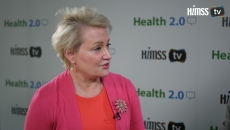Population Health
Plans will jointly operate 14 community resource centers across Los Angeles that will leverage personalized technology solutions to improve health and identify disparities.
AI and SDOH developed separately, but they're now converging as technology keeps up with the need to make actionable use of data.
Susan Dentzer, president and CEO of the Network for Excellence in Health Innovation (NEHI), discusses Healthcare Without Walls, saying technology is no longer a barrier to at-home healthcare.
First-of-its-kind partnership uses IT to connect patients to social service organizations in upstate New York.
The first edition of the HIMSS TV Deep Dive series looks at the crisis of opioid addiction in the United States, and how to treat and prevent overuse and addiction.
The Community Well-Being Index will show how the environment affects access to health resources, readiness to change and overall health risk. Private sector and academia collaboration
Zing Health is a community-focused, physician-led health plan that addresses the social determinants of health.
Food insecurity is more than about being hungry, it's about the estimated 1 in 8 Americans who do not have access to nutritious food.
With value-based care, there are more incentives for providers to take SDOH factors into account, but few have a good handle on it.
Since 2016, the proportion of employers using health-related mobile apps has risen by 46%.

